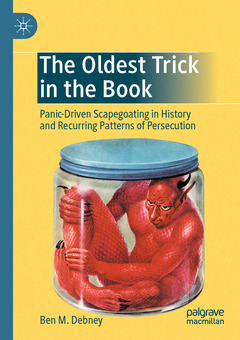The Oldest Trick in the Book, 1st ed. 2020 Panic-Driven Scapegoating in History and Recurring Patterns of Persecution
Auteur : Debney Ben M.

Establishes moral panics as the driving force for scapegoating and persecution in history by demonstrating historical linkages between various manifestations of elite crisis management and common purposes in scapegoating
Establishes panic-driven scapegoating as the principle means by which elites avoid accountability for the social, economic and other consequences of their own existence as a class
Establishes panic-driven scapegoating as a discourse with five distinct stages: (1) Mobilisation, (2) Targeting, (3) Legitimation, (4) Persecution and (5) Restoration
Establishes a unique and discernible logic characterising this discourse and points to one of the primary means by which history continues to repeat itself
Date de parution : 07-2021
Ouvrage de 399 p.
14.8x21 cm
Disponible chez l'éditeur (délai d'approvisionnement : 15 jours).
Prix indicatif 126,59 €
Ajouter au panierDate de parution : 07-2020
Ouvrage de 399 p.
14.8x21 cm
Disponible chez l'éditeur (délai d'approvisionnement : 15 jours).
Prix indicatif 126,59 €
Ajouter au panier